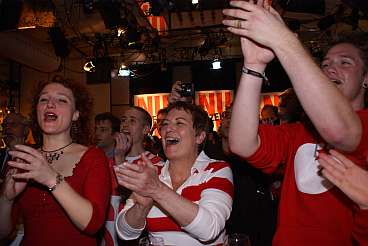Provincial Assemblies: SP repeats parliamentary election triumph in regional poll
Provincial Assemblies: SP repeats parliamentary election triumph in regional poll
Following its increase from nine to twenty-five parliamentary seats in last November’s election, the SP has marked another enormous electoral victory in today’s polls for the Netherlands’ regional governmental assemblies, the “Provinciale Staten”.

Tripling the proportion of votes it received at the last provincial election in 2003, the party saw its representation rise from 38 to 83 across the nation – despite a reduction in the total number of seats. It also had the satisfaction of seeing five members elected to the last Provincial Assembly where no SP representative had previously sat, the north-eastern region of Drenthe. The result also means that the SP’s group in the Senate, which is elected by Provincial Assembly members rather than directly by the voters, will rise in numbers from four to twelve. Attention to this aspect of the election was great, as it would determine whether the newly-formed government, which has a majority of 80-70 in the main legislative chamber (the Tweede Kamer), would also have a majority in the influential though less powerful Senate (or Eerste Kamer). As it turned out, the three governing parties managed to win enough Provincial Assembly seats to ensure that they will have a majority of seven in the seventy-five seat house. Moreover, although the right-wing “free market liberals” of the VVD failed to increase their likely representation, they will remain the largest opposition party, with fifteen seats. In the Tweede Kamer, the SP has twenty-five to the VVD’s twenty-two.

Greeting the result, and thanking all those who had made it possible, SP leader Jan Marijnissen said,
“In the last year we have had three elections, and all three – local, parliamentary and regional – have been extraordinarily successful for the SP. The SP has become a major party – in many local councils, in the provincial assemblies, and in both houses of parliament. This new position is great for everyone who is sympathetic to the SP, but it also brings enormous responsibilities for the party in general and its elected representatives in particular. We are all conscious of this and will put everything into our work to ensure that we don't let down the people who have placed their trust in us.”
Appealing for all those who have supported the party to join, Mr Marijnissen said that “The SP is not only a political party, like any other party; we are also a social movement with its roots in the people. Such a party and such a movement can only be successful if enough people are prepared to devote themselves to ensuring this.”
- See also:
- Dutch elections
